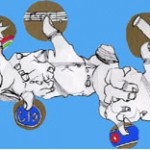Opera Reinventor redefines the classroom for MFAW students
Ruth Margraff, new Associate Professor of Writing and Playwriting at The School of the Art Institute Chicago, doesn’t appear to be the typical Brown and Yale educated professor, and her plays, such as Deadly She-Wolf Assassin at Armgeddoni only confirm her deviance. In fact, nothing about her seems typical, including her childhood; Margraff performed in churches all over the Midwest to raise money for her father, an Ohio preacher and her mother, a peace-keeper in Bosnia. “Being thumped pretty often with the Bible in the Bible belt,” she says, gave her a “wealth of King James imagery and hellfire swirling through [her] language,” which comes in handy when you’re writing operas like Night Vision: A Third to First World Vampyre Opera.
Margraff has seen many parts of the world, both as a teacher and playing the accordian and Cretan lyra in the band Café Antarsia Ensemble, a three piece acoustic group that plays world folk songs inspired by Greek blues and Balkan Roma gypsy music. Her travel experience and her love of eclectic music might help explain why she often refers to her written work as world folk opera. “Almost everything I write comes from music,” Margraff says, “so I’ve been put in the categories of music theater or experimental opera, new opera, etc.” But Margraff is exploring the potential genres of working-class opera, folk opera and non-western opera. “But then you have the opera police who say the libretto should always be light and airy… not [about] subjects [like] genocide. Just the women should die [in operas]!”
In addition to playing with her band, Margraff has great enthusiasm for collaborative projects. She has worked with saxophonist, playwright, and activist Fred Ho to write and compose a musical performance for 12 choreographed ninjas. Her artistic process is about trying “to be awake and alert” and the need to respond to the world, “even when it is involuntary or brutally laborious.”
For Margraff, being able to “work with art students and in the framework of the school of art” is something she has “been looking for. A kinship with the deeper level of abstraction that is possible with the fine arts, that is limited when it comes to text or literature for some reason.”






















